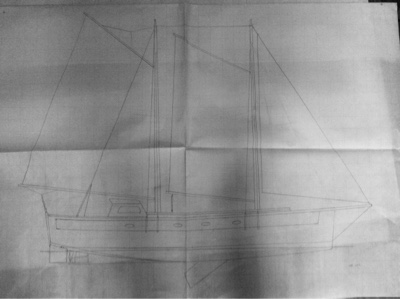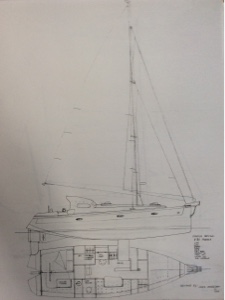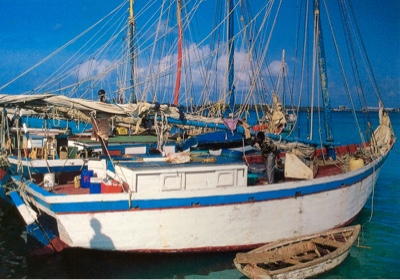The next boat was a 17-8" Robert Tucker bilge keel Shilloett sloop. This got me offshore looking down into the depths as we sailed over vast kelp beds off of Point Loma.
From there my family did a stint in living in the mountains of California with a skiff in the yard always needing some work.
At the age of 15 my parents had sold out all their land, house and most all belongings to move aboard a 35' Sea Witch ketch and sail off to Mexico and a new life. This was in 1973 and I was 15 years old. This is when I really fell in love with the lifestyle of being a sailing Vagabond.
16 years old with our ketch on the beach careened for a bottom paint job in Isla La Prida in the pacific islands of Panama.
In the ensuing years of cruising, sailing and living aboard I observed and learned a lot about other people's boats and designs. The most important things I learned from this time afloat was that I would always want a boat that I could afford and maintain to be ready to sail at all times. It had to be a design that I could sail anywhere alone so as to not have to rely on crew or others. Being able to go into shallow water would always be a plus and I wanted to build my own design so I would know every inch of this vessel. Most all the boats that I came across I could not afford or they lacked in so many things that I was looking for. To be able to carry a large hard dinghy, sail well to windward, ease of sail changing and reefing, simple to maintain inside and out, and to be as uncomplicated as possible to do all the above.
This quest has lead me to many different boats so far in my life of building ,buying and fixing up boats for myself. Fortunately I love all kinds of boats so have gone down many different paths as I could learning about the pros and cons of the many types and ways one can get about the worlds oceans on a very limited budget.
My first real job was at the age of 18 working for Stamas boats in their R&D a dept for $2.31 an hour.
By the time I had my own custom boat building shop in Key Largo in Florida at the age of 25 I was up to about $15.00 an hour with my ex wife Lawanda as my partner. For most of my working career from there till I helped start up Hells Bay Boatworks I have worked my way up and around making from $12.50 an hour up to $20.00 an hour. Owning A part of Hells Bay put me over the top. I started out there Making $20.00 an hour as an owner till when I sold out 3-1/2 years later making over $100,000.00 a year. Since selling out when I work on boats or projects I charge $25.00- $30.00 an hour depending on the project. My average income over my 39 year working career comes out to less than $18,900 a year. BUT over this 39 year work period I have taken time off building my own boats and sailing about the Atantic ocean in them for 58,000 miles logged and over half that time period being unemployed by choice. I have very rarely been insured for health, never for my boats and only fire insurance for my small houses. Every thing we own is paid for from this work life that we live by the idea of we only buy what we can afford to eat, and use.
I try to work no more than 4 months a year with this being what we live on, cruise with and have built our land base home with. But I do work for some stretches to get ahead a bit more for future cruises or building projects.
This earning level guides me in a huge way in dreaming of future boats as to what it will really cost to build in materials and time. I don't want to spend huge amounts of my life units building a boat for myself as I would rather be paid to be building someone else's dream and when done I can go off and sail about for months at a time. So my designs are for very fast, easy and affordable construction.
But they are not throw a way boats like other designs. I really like seeing my 32 year boats I designed and built still being used everyday and still going strong.
These are the stability drawings and calculations that my friend Wyatt Huggins did for me. He is a real navel architect and has been my go to guy to help me when something is over my head. He did all the stability, and weight numbers for me after the boat was built. I traded working on a skiff of his for this work. I have used these real numbers and my real sea sailing experience in evaluating and coming up with the other designs that follow.
I have had this boat over farther with the mast in the water when I was run over by a U.S. Navel warship when single handing to the U.S. Virgin Islnds. They were running without lights playing war games when the ran me over. The Hogfish just popped back up and kept on sailing.
There are 40 pages in total for these calculations
The Hogfish with an empty hull as we just repainted the entire insides. Taking friends out for a sail in very little wind.
Rachel and our two month old daughter Kalessin in the pouch sailing along with the tiller tied off. The block and tackle on the cabin top is for the centerboard. When the block dropped you knew you were hitting the bottom. We used the cabin top to collect rain water and the decks to. Life lines were just installed because of the new baby. Our daughter Kalessin is 25 years old now and has crossed the Atlantic three times now.
Rachel leaning against the tabernacle. All my designs can lower the mast with out a crane doing it on your own.
Hogfishes deep cockpit. All my lugged rigged designs have this deep cockpit in them.
See the cat schooner rig. This would be a sweet looking boat at anchor and under sail. But not much livable space below.
The hull lines of the French Ovni sloops that are so popular. I have not seen one yet that can out sail the HFM. Because they are relatively light they are a bit jumpy at sea.
My early box boat phase. We were running out of space on the 32' hogfish so I was dreaming of a big boat to last a life time. Took awhile to get to the right place, time and money to get there. When we did I had lots more sea miles and we ended up with the HFM.
This is my version of how I would redo my first real sailboat the French built and designed Corsair sloop.
This little 18' sloop carried me through out the Bahamas in 1977. I sailed engineless from Tarpon Springs Florida as far south as Rum cay and through all the Bahama out islands at the age of 19. I had so much fun.
When in the Virgin Islands working for Gold Coast Yachts in 1990-92 I started to think of big boats.
You can see I was still naive about bow noise.
Over the years I have loved just trying to come up with the simplest live aboard shoal draft go anywhere sailboat. With all these Chinnese lug rigged designs my vision is for a long lean easily driven hull that has very shallow draft but can still carry all supplies needed for a couple. At anchor the boat has a very comfortable cockpit, is very liveable for two below with room for two guests. The mizzen is for getting underway and all the other things it can do so well. These boats will have power for going to weather in very light winds which would be these boats only weak point.
A big sloop figuring out all the struckural bulkheads
A nice 30' box boat that can be built in no time and very cheaply. So simple to rig. No winches or any hardware to really deal with.
Long lean and very easy to sail along.
Hull lines for a 30' sloop. I feel the daggerboard can go this far forward as these hulls go so well without it. When it's down you get your lateral plane. When off the wind all you need it for is to pivot on in strong heavy going in large seas. Otherwise it's up.
I love the look of double Enders.
20' All designs will carry a large hard dinghy.
Sessing out cockpit ideas for Bahamas type sailing
Looking for some speed with shallow draft. Nice big cockpit.
Super shoal draft with a very fast rig. All about looks and just plain sailing but with the ability to get into very shallow water. Nice layout for two plus two guests.
Thinking of big boat and lots of cargo space .
Another work boat idea with a box boat shape.
Glenn Maxwell and I planned on building this catamaran design of mine and going into the cattle maran business, that's day charter sailing. We just looked at each other after I finished the drawings and came to realize there was so much more fun things to do than make buckets of money. We both are still having tons of fun.
My version of Matt Laydens Paradox design. A weighted daggerboard for offshore work, the mast will stow when at sea to ride to a sea anchor well, and a cockpit outside.
HFM interior details
34' hogfish
32' Hogfish with today's thinking
28' Hogfish
Offshore hogfish 38' lug rigged schooner.
32' traditional
Light weight
Jubilees sail plan and rigging plan sheet
Jubilee under sail
Just think of cruising In this rig. Something to look back at as you row ashore.
This is typical of my hull construction drawing plans.
Doodles
HFM sail plan today
HFM dreaming of a big square head mainsail and code zero
I don't know what that girl is doing on my sketch. See I get side tracked thinking of all kinds of vessels
If I build another boat it will most likely be a big ole Junk.
11 years ago in Grenada I returned from racing in Antigua. Anchored next to the HFMS was Pete Hills two masted Catamaran China Moon. Rachel said he had heard we were here so he had sailed up from Tinidad to meet me. He wanted to know if I would be intrested in designing his next boat. He had been waiting 3 days for me to return from racing. We talked boats. What an honor to be in his company.
What he was looking for was a 28' single masted lug rigged sloop to live aboard with 1-2 people. He liked the earlier Hogfish and the Recent HFM. I was very busy building the big house in Grenada. I had been racing on my bosses boat. I had no time to spare. But I did take time to draw this up for Pete.
Read about Pete and you will see what he's been up to since this time.
Remember people sail boats! These Haitian sloops have no engines and sail back and forth to Nassau from Haiti with cargo to this day. Most new sailors can barley get out of the slip with out all mod coms.
HFM sailing into Mindalo in the Cape Verde islands out sailing the boat boys that are chasing us. I am using the staysail to short tack up the bay. We have just arrived at 7:30 in the morning after a 7 day passage from the Canary Islands.
Just think of this boat at anchor. No stays, flush deck, rudder kicked up out of the water. You are in 3' of water away from the others. So simple. At sea she will sail right along without fuss. When the wind is light and heads you, turn on the engine and tick away to weather at 5 knots without fuse. So more food for thought. Sorry about the crappy pictures but you can get an idea of what's been going around in my head.
























































No comments:
Post a Comment